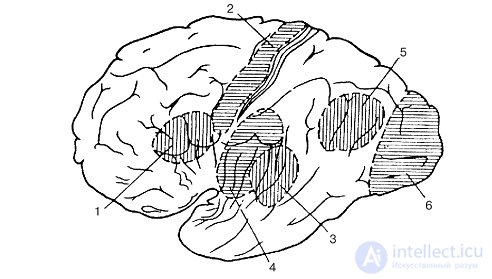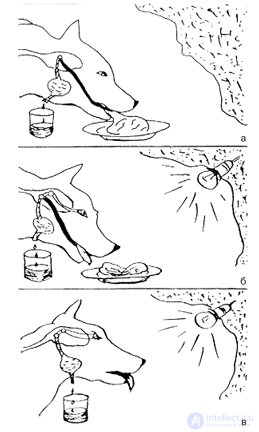Lecture
The term "reflex" was introduced by the French scientist R. Descartes in the XVII century. But to explain the mental activity, he was applied by the founder of the Russian materialistic physiology I. M. Sechenov. Developing the teachings of I. M. Sechenov. IP Pavlov experimentally investigated the peculiarities of the functioning of reflexes and used the conditioned reflex as a method for studying higher nervous activity.
All reflexes were divided by him into two groups:
Unconditioned reflexes - innate body reactions to vital stimuli (food, danger, etc.).
They do not require any conditions for their production (for example, salivation at the sight of write). Unconditioned reflexes - a natural stock of ready, stereotypical reactions of the body. They arose as a result of a long evolutionary development of this species of animals. Unconditioned reflexes are the same in all individuals of the same species. They are performed using the spinal and lower portions of the brain. Complex complexes of unconditioned reflexes manifest themselves in the form of instincts.

Fig. 14. The location of some functional areas in the human cerebral cortex: 1 - speech education zone (Broca center), 2 - area of the motor analyzer, 3 - zone of analysis of verbal verbal signals (Wernicke center), 4 - area of the auditory analyzer, 5 - written analysis verbal signals, 6 - area of the visual analyzer
But the behavior of higher animals and humans is characterized not only by innate, i.e. unconditional reactions, but also by such reactions that are acquired by this organism in the process of individual life activity, i.e. conditioned reflexes . The biological meaning of the conditioned reflex is that the numerous external stimuli that surround the animal in natural conditions and are not themselves of vital importance in themselves, preceding the animal’s food or danger in the experience of satisfying other biological needs, begin to act as signals by which the animal focuses its behavior (Fig. 15).
So, the mechanism of hereditary adaptation is an unconditioned reflex, and the mechanism of an individual changeable adaptation is a conditioned reflex, produced by combining vital significant events with accompanying signals.

Fig. 15. Scheme of formation of a conditioned reflex
The conditioned reflex is produced on the basis of any of the unconditional reactions. Reflexes to unusual signals that are not found in a natural setting are called artificial conditioned. In the laboratory, you can develop a lot of conditioned reflexes to any artificial stimulus.
With the concept of a conditioned reflex, IP Pavlov linked the principle of signaling of higher nervous activity , the principle of synthesis of external influences and internal states.
Pavlov’s discovery of the basic mechanism of higher nervous activity — the conditioned reflex — was one of the revolutionary gains of natural science, a historically turning point in understanding the connection between the physiological and the mental.
The discovery of complex mechanisms of the human brain activity, the identification of patterns of higher nervous activity began with the knowledge of the dynamics of formation and changes in conditioned reflexes.
see also dynamic stereotype
Comments
To leave a comment
General psychology
Terms: General psychology